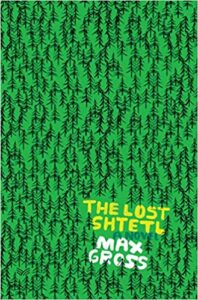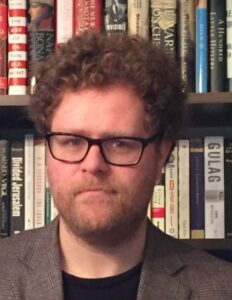By Max Gross
 What if — due to a name change, a mistake in the records, a bureaucratic snafu — a tiny Jewish village in Poland was dropped off the official records and “lost” for centuries?
What if — due to a name change, a mistake in the records, a bureaucratic snafu — a tiny Jewish village in Poland was dropped off the official records and “lost” for centuries?
What if the village was so self-sufficient that it didn’t need anything from the outside world? Its residents spoke only Yiddish. They used old money. Surrounded by a thick forest, few people other than gypsies had reason to find it.
A village so isolated that even the Nazis missed it during the Holocaust.
In author Max Gross’s fable, the spell is broken when a warring married couple, Pesha Rosenthal and Ishmael Lindauer, get a divorce. Still battling each other, each former spouse disappears without a trace or note of explanation. Did the ex-husband murder the ex-wife? Did they get eaten by animals? Were they abducted?
The town leaders decide they need to send someone out to notify the gentile authorities.
They select Yankel Lewinkopf, the son of the village prostitute. He’s honest, obedient, hard-working and maybe something of an idiot.
Helped by the local gypsies, Yankel makes it to Smolskie. There, he’s taken to be a prankster. His clothes are antiquated. He doesn’t speak Polish well and he seems naive. The police don’t believe his story. As he’s leaving the station, he gets hit by a car and is taken to a hospital.
The hospital’s psychiatry department spares no effort to diagnose what’s wrong with him. When he tells them about his village of Kreskol, they don’t believe him. They try anti-psychotic drugs. Yankel’s story doesn’t change. They bring in university professors to figure out what language he is speaking.
At last, they decide that the best way to deal with his psychosis is allow him to lead them to his “imaginary” village.
And at this point, a cascade of unintended consequences begins. Having come to the attention of the authorities, they must now receive services — and pay taxes. Their money has to be updated, a suggestion that is met with suspicion. The State of Israel, which they didn’t know existed, recognizes them. They become a destination for Jewish tourists worldwide. And they discover a bright new universe of material goods.
This is a story that grows to ever more absurd extremes. Author Max Gross is a wonderful builder of a fantasy world. But the plot falters with the characters. They aren’t as convincing or as interesting as the events that befall the shtetl of Kreskol.
The Author: Max Gross (1979 – )
 After days of working as a reporter and weekly newspaper editor, Max Gross came home to write THE LOST SHTETL.
After days of working as a reporter and weekly newspaper editor, Max Gross came home to write THE LOST SHTETL.
A long-time fan of Yiddish literature, Gross has a dark fascination with the Holocaust. The idea for THE LOST SHTETL came to him while reading Lucy Dawidowcz’s 1975 nonfiction book THE WAR AGAINST THE JEWS. He originally thought it would be a short story but the challenge of the premise grew until he had to write it as a novel.
To learn about shtetl life, Gross visited Krakow and Auschwitz and relied on historical accounts. He has said his most useful sources were THERE ONCE WAS A WORLD: A 900-YEAR CHRONICLE OF THE SHTETL OF EISHYSHOK by Yaffa Eliach and books by Glenn Dynner.
Gross is the editor-in-chief of The Commercial Observer and formerly worked at The New York Post covering travel, real estate and food. He also worked at The Jewish Daily Forward early in his early career. His first book, FROM SCHLUB TO STUD: HOW TO EMBRACE YOUR INNER MENSCH AND CONQUER THE BIG CITY, was a memoir published in 2008.
Gross lives in Queens with his wife and son.


